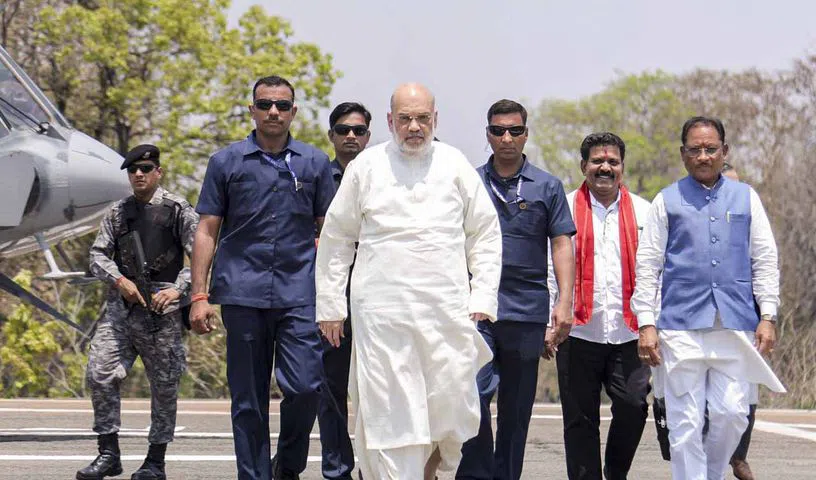
Negotiating with Maoists is a double-edged sword. It is imperative for the government to keep past experiences in mind and tread cautiously
By PV Ramana
In a significant development, Abhay, spokesperson of the Central Committee of the Communist Party of India (Maoist), in a statement issued on April 2, said they were ready to sit at the negotiating table with the elected government.
Abhay said Maoists welcomed a round-table meeting that was held in Hyderabad on March 24 on ‘Stopping of war in Central India —announcement of ceasefire by the Indian government’. He, however, called for a ceasefire and halting the ongoing ‘Operation Kagar’ in Central India — Chhattisgarh and Odisha. Chhattisgarh Chief Minister Vishnu Deo Sai immediately responded positively to the offer.
Past Talks
Earlier, there were two attempts to hold talks with the Maoists, both in the then undivided Andhra Pradesh. The first was in 2002. They were termed as ‘talks about talks’. In other words, they were held to decide the agenda for future negotiations. They fell flat as there was no agreement on the agenda.
The second attempt was made in 2004. The Committee of Concerned Citizens (CCC), as well as political parties, suggested to the government to it hold talks with the rebels. Notably, all political parties in the State — Congress-I, BJP, CPI and CPI(M) — favoured the creation of a congenial atmosphere to hold negotiations with the PW and eventually hold talks. The objective of all these actors was to have respite from the ceaseless violence that plagued the State.
Ill-conceived Idea
The idea itself was ill-conceived. At the last minute, the government hurriedly invited the Communist Party of India (Janashakthi), too, for the talks. A day ahead of the scheduled commencement of the talks, then Andhra Pradesh State Committee Secretary Akkiraju Haragopal alias Ramakrishna alias Pantulu famously said on October 14, 2004, that ‘talks were war by other means’. He meant to say they would compel the government to accede to their demands. He received 836 petitions from the general public.
For the Maoists, it was a win-win situation as well as a loss of face. Win-win because the government later distributed several thousand acres and also formed the Remote and Interior Areas Development Programme, headed by a Cabinet Minister-rank public representative. It was a loss of face as they could not fully realise their demands. They were, thus, laid bare by the futility of their revolutionary agenda.
After the talks on October 15, there was a lull for a few months, but on Jan 16, an armed squad shot down MLA Adikesavula Naidu. The following day, the Maoists trashed the peace process and returned to the forests
A few days ahead of the talks, Politburo member Cherukuri Rajkumar alias Uday (since deceased) issued an 11-point charter of demands. The talks were essentially held on three demands: land to the tiller, democracy and self-reliance. The government made it clear they would not be allowed to come overground with weapons.
Just ahead of the talks, on October 14, 2004, Ramakrishna announced the merger of the Communist Party of India (Marxist-Leninist) Peoples War (PW) and the Maoist Communist Party of India (MCC). The merger took place on September 21, 2004, after prolonged rounds of discussion. Nepal’s Pushpa Kamal Dahal ‘Prachanda’ convinced the two to wage a joint war. The two sides saw merit in his suggestion — strength lies in unity.
The merger announcement came as a rude shock. What were until then two separate entities — one operating in Southern India and another in Northern India — now became an all-India organisation. It now stretches from the borders of Nepal in Uttar Pradesh and Bihar down to Western India to Karnataka, spanning 11 States.
The entire country waited eagerly for the outcome of the talks as they would have far-reaching implications. Here was an elected government that was holding talks for the first time with a proscribed group. The talks were led by then State Home Minister Jana Reddy, accompanied by K Vijayarama Rao and Tammineni Sitaram. The government made it clear they would not be allowed to come overground with weapons. They duly deposited the weapons in a safe place. The government accorded them ‘state guest’ status. A ceasefire monitoring group comprising well-meaning individuals was also formed.
The talks were extended by a day and held between October 15 and 17, 2024. There was a lull for a few months. On January 16, 2005, an armed squad shot down Adikesavula Naidu, an MLA. The following day, the Maoists trashed the peace process and returned to the forests.
Pack-up time
Negotiating with the Maoists is a double-edged sword. The government must keep past experiences in mind and tread cautiously. For the Maoists, it is four steps backwards and one step forward. These talks will yield no result.
They, however, need to be given a chance and seek the mandate of the public. If they can get legitimately elected in any State, so be it. But, given the existing objective conditions, they will not be able to form the government. A few stubborn ones shall remain, but they will be a mere peripheral nuisance. They will get exposed. It is pack-up time for the Maoists, if not by March 2026, soon thereafter.







